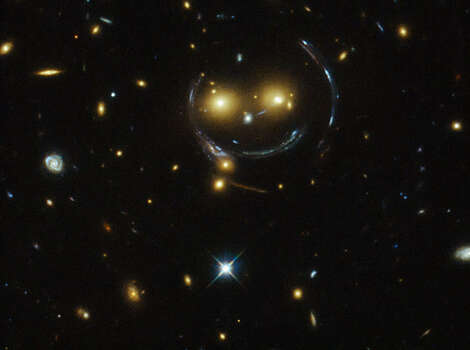Welcome to DU!
The truly grassroots left-of-center political community where regular people, not algorithms, drive the discussions and set the standards.
Join the community:
Create a free account
Support DU (and get rid of ads!):
Become a Star Member
Latest Breaking News
General Discussion
The DU Lounge
All Forums
Issue Forums
Culture Forums
Alliance Forums
Region Forums
Support Forums
Help & Search
Science
Related: About this forumHubble Telescope spots a 'smile' in space

Photo By NASA/ESA
A galaxy cluster "smiles" at the Hubble Telescope.
The Hubble Telescope detected a "smiley face" out in the far reaches of the universe. The grinning figure actually shows an enormous galaxy cluster. SpaceTelescope.org explains:
"In the case of this 'happy face', the two eyes are very bright galaxies and the misleading smile lines are actually arcs caused by an effect known as strong gravitational lensing.
Galaxy clusters are the most massive structures in the Universe and exert such a powerful gravitational pull that they warp the spacetime around them and act as cosmic lenses which can magnify, distort and bend the light behind them."
The smirking smile and the contours of the face are caused by that warping and bending of light around the cluster. The effect is also known as "Einstein ring."
Read more: http://www.chron.com/news/nation-world/space/article/Hubble-Telescope-spots-smile-in-space-6071765.php
InfoView thread info, including edit history
TrashPut this thread in your Trash Can (My DU » Trash Can)
BookmarkAdd this thread to your Bookmarks (My DU » Bookmarks)
7 replies, 2467 views
ShareGet links to this post and/or share on social media
AlertAlert this post for a rule violation
PowersThere are no powers you can use on this post
EditCannot edit other people's posts
ReplyReply to this post
EditCannot edit other people's posts
Rec (24)
ReplyReply to this post
7 replies
 = new reply since forum marked as read
Highlight:
NoneDon't highlight anything
5 newestHighlight 5 most recent replies
= new reply since forum marked as read
Highlight:
NoneDon't highlight anything
5 newestHighlight 5 most recent replies
Hubble Telescope spots a 'smile' in space (Original Post)
TexasTowelie
Feb 2015
OP
liberal N proud
(60,334 posts)1. Someone is smiling down upon us.
Xipe Totec
(43,890 posts)2. Yea, the Cheshire Cat. nt
trusty elf
(7,394 posts)3. .....
[img] [/img]
[/img]
TexasTowelie
(112,204 posts)4. Well, who didn't see that coming?
longship
(40,416 posts)7. Well done! DUzy worthy!
Very well done!
![]()
Vic Tree
(90 posts)5. Frosty!
He's come back to get us for letting him melt! RUN FOR THE HILLS! ![]()
longship
(40,416 posts)6. Don't you just love gravitational lensing?
Einstein's general theory of relativity rules!
R&K